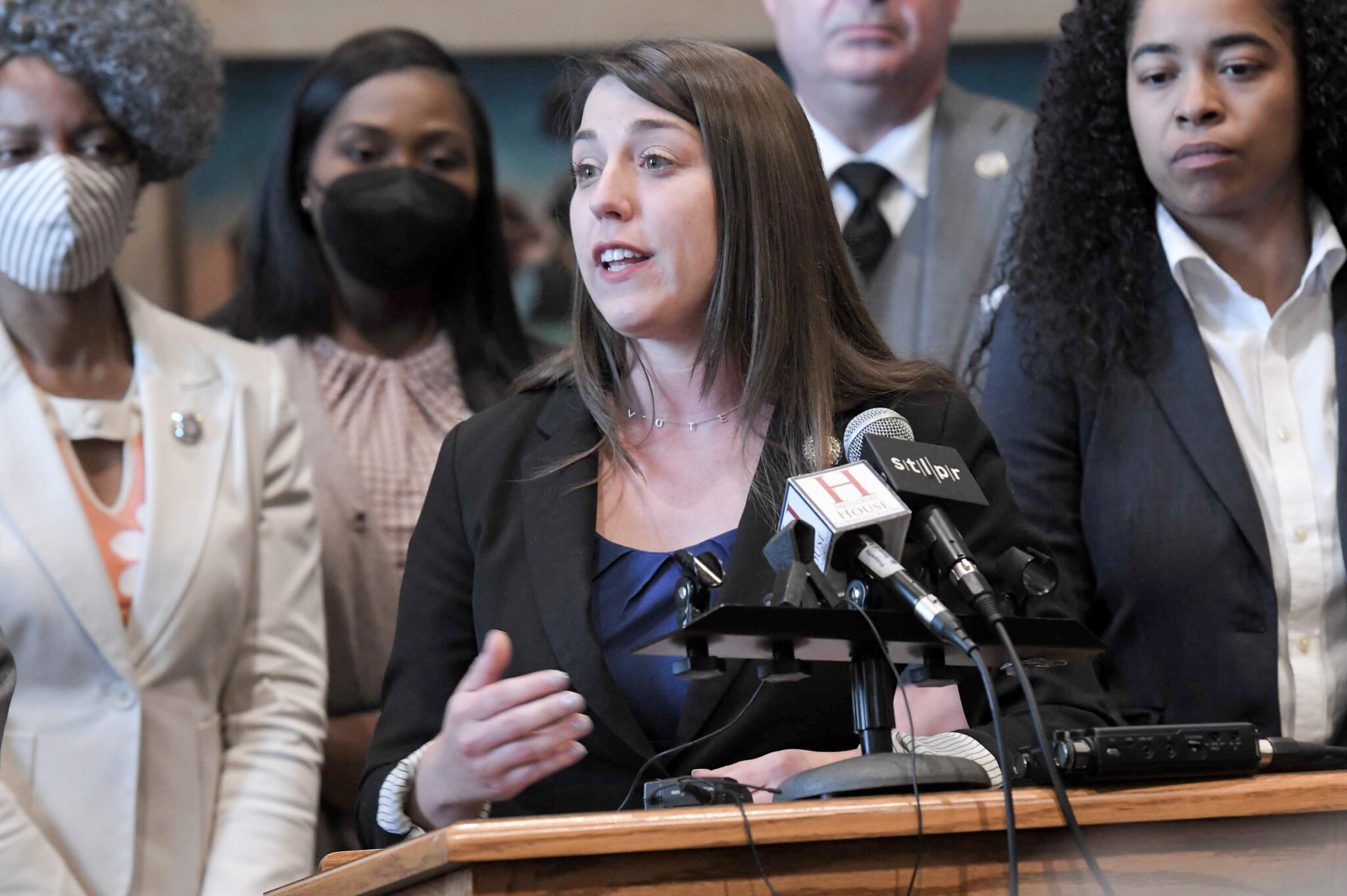Missouri Democrats hope Kansas, Illinois will help pay for out-of-state residents’ abortions

Missouri’s top Democratic lawmakers have yet to receive a formal response to letters urging governors in Kansas and Illinois to help pay for abortions for out-of-state Medicaid patients, though a Kansas lawmaker said it is highly unlikely given Republican dominance of the state’s legislature.
In letters sent Wednesday and first reported by the Associated Press, House Minority Leader Crystal Quade and Senate Minority Leader John Rizzo urged Kansas and Illinois’ governors and their legislative counterparts to take advantage of a potential waiver President Joe Biden unveiled in an executive order aimed at bolstering access to abortions.
While specifics on how the new option will work in practice are unclear, the White House directed the U.S. Department of Health and Human Services to consider allowing states to request waivers for their Medicaid programs to pay for reproductive health care for out-of-state patients who are traveling from states that have banned or restricted abortion access.
Kansas’ Senate Minority Leader Dinah Sykes, D-Lenexa, said Friday that she is researching what the option would entail, but noted that if it requires legislative approval it would face long odds in the Kansas legislature.
“With the current makeup of our legislature, there’s no way that that would go through,” Sykes said, later adding: “If it’s something that we can move forward without legislation, that is great, but I really think we’re gonna have that pushback.”
Similar waivers submitted to the Centers for Medicare and Medicaid Services have required legislative approval in Kansas, Missouri and Illinois, like in the case of the states taking action to extend postpartum health care coverage.
Kansas is set to reconvene for its annual legislative session in January. A spokesperson for Kansas Gov. Laura Kelly, a Democrat, did not immediately respond to a request for comment Friday.
Where there may be more political will is in Democratically-controlled Illinois, where the state’s Medicaid program already pays for abortions for its residents through state funds.
The Illinois legislature is set to convene for a special session on abortion rights, but a date has not yet been announced. Gov. J.B. Pritzker and legislative leaders said in July lawmakers would be convened “in the coming months,” according to The Chicago Tribune.
Representatives for Pritzker and House Speaker Chris Welch did not immediately respond to requests for comment Friday. A spokeswoman for Senate President Don Harmon said the office hadn’t yet received the letter.
Due to restrictions on when federal funds can be used to pay for abortions, the waivers would likely only extend to abortions necessary to save the life of the patient or in the cases of rape or incest, Quade, D-Springfield, and Rizzo, D-Independence, noted in their letters.
Still, the Missouri lawmakers said the coverage would be meaningful in a state that they said has been plunged into a “public health crisis” after nearly all abortions were made illegal the day Roe v. Wade was overturned.
In Missouri, abortions are now illegal and only permitted in the instances of a medical emergency. There are no exceptions for rape or incest. Medical providers who violate the law risk being stripped of their medical license and prison time. Physicians have told The Independent they’re concerned lifesaving treatment for patients with high-risk pregnancies will be delayed out of fear of prosecution.
“These laws were intentionally designed to force birth at any and all costs, and treat mothers as little more than incubators,” Quade and Rizzo’s letters read.
Kansas made waves Tuesday when voters overwhelmingly defeated a constitutional amendment that would have stripped the right to abortion from the state’s constitution — preserving access to the procedure not just for Kansas but the thousands of Missourians and out-of-state residents that flock to the state for the procedure.
Whether Tuesday’s vote means Kansans would be open to using tax dollars to pay for out-of-state residents’ abortions remains to be seen.
Sykes said Kansans of all political stripes came together to reject extreme policies with Tuesday’s vote, but the nuances of which policies they support to continue to protect access still has to be fleshed out.
“I think what happened on Tuesday was, we are not an extreme state, and taking away the right was an extreme measure,” Sykes said. “But I think we have to continue having conversations to see where 60% of Kansas — where they actually are. And we haven’t been able to have that conversation in the past, but I think this does open the door to that.”
Last year, 3,458 Missourians received an abortion in Kansas — an overwhelming majority of the abortions performed on out-of-state residents and roughly 44% of all abortions performed in Kansas that year, according to preliminary data.
In 2020 in Illinois, 6,578 abortions were performed on Missouri residents — nearly 68% of the 9,686 abortions performed on patients traveling from out-of-state that year.
On Thursday, Pritzker announced a 20% rate increase in Medicaid reimbursement for abortion services will go into effect Sept. 1, costing an estimated $3 million annually. In addition, Pritzker also announced a $2 million increase in funding for Title X family planning providers and nixed a requirement that providers receive a denial from Medicare before requesting payment for Medicaid.
“Illinois abortion providers have been working overtime since the Supreme Court overturned Roe v. Wade,” Pritzker said in a news release. “They need support as they take on this new burden on the frontlines of this fight. Supporting them with reimbursement increases allows them to focus on their important work without worrying about rising costs of supplies and services.”
Illinois is one of 16 states whose Medicaid programs pay for abortions beyond federal requirements, according to Kaiser Family Foundation, a nonprofit that studies national health issues.
However, patients who are leaving their home state to access one can’t be reimbursed. In Illinois most private insurers are required to cover the procedure, too.
While an unusual step, Quade and Rizzo said it was necessary to reach out to their neighboring states to urge them to request a waiver under the new executive order.
They noted a report released Monday by the state’s Pregnancy-Associated Mortality Review board found that women on Medicaid made up the largest percentage of pregnancy-related deaths at nearly 53% over the course of the three years analyzed. Women on Medicaid were also eight times more likely to die within one year of pregnancy than their counterparts with private health insurance.
“Every day, we hear from patients who have been forced into unimaginable and dangerous situations during the most vulnerable moments of their lives by Missouri’s draconian laws,” the letters read. “This extraordinary intrusion by our government into our citizens’ most private matters puts lives at risk every second of every day.”
Miss Clipping Out Stories to Save for Later?
Click the Purchase Story button below to order a print of this story. We will print it for you on matte photo paper to keep forever.

